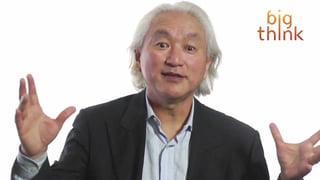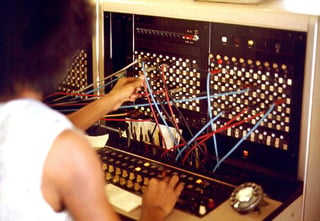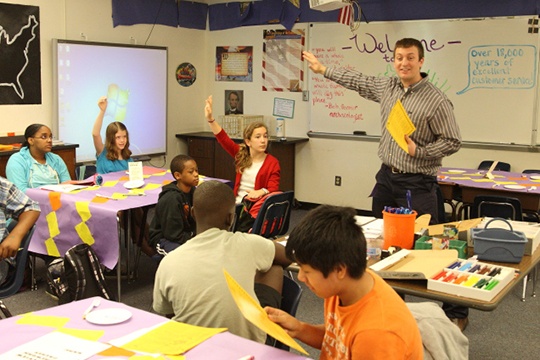At the June 27, 2016 ISTE famed futurist Dr Michio Kaku spoke to the assembled  educators about the coming “digitization” of many industries. He thinks it is only a matter of time--and not much time at that!--before many--maybe even most-- jobs now held by humans will be handled more cheaply and efficiently by robots. If my own past is any guide, I think he’s right. But he was also quick to point out that there were some jobs that he didn’t see replaced by artificial intelligence any time soon--if at all. Teaching, Dr Kaku believes, is one of those jobs. So far nothing digital has appeared on the horizon that looks likely to replace the classroom teacher. I’ve had reason to agree with him there too...
educators about the coming “digitization” of many industries. He thinks it is only a matter of time--and not much time at that!--before many--maybe even most-- jobs now held by humans will be handled more cheaply and efficiently by robots. If my own past is any guide, I think he’s right. But he was also quick to point out that there were some jobs that he didn’t see replaced by artificial intelligence any time soon--if at all. Teaching, Dr Kaku believes, is one of those jobs. So far nothing digital has appeared on the horizon that looks likely to replace the classroom teacher. I’ve had reason to agree with him there too...
In the mid nineteen-sixties I had a job as a switchboard operator at a newspaper while attending college. To spare my readers a long-winded description of a switchboard I’ ve provided the splitting-image of the board I worked on. When a call came in a light would start blinking on the board, and I’d plug a wire into the hole beneath it. The caller would ask for such and such an editorial office, and I’d plug another wire into the hole beneath the corresponding office. A few minutes later the light under the office number would flash and I’d know that the parties had hung up; I’d pull both wires out of the holes and go back to reading science fiction. It took little or no training, few skills other than the ability to put a round peg in a round hole and paid minimum wage.
ve provided the splitting-image of the board I worked on. When a call came in a light would start blinking on the board, and I’d plug a wire into the hole beneath it. The caller would ask for such and such an editorial office, and I’d plug another wire into the hole beneath the corresponding office. A few minutes later the light under the office number would flash and I’d know that the parties had hung up; I’d pull both wires out of the holes and go back to reading science fiction. It took little or no training, few skills other than the ability to put a round peg in a round hole and paid minimum wage.
But when was the last time this side of the ocean anyone saw, much less worked, at a switchboard like this one? Except as confusing bundles of wires hidden in air-conditioned rooms, the switchboard has disappeared; the human operator replaced by transistors guiding conversation impersonally from connection to connection. Oh sure, there must be a few old switchboards still out there, but it would probably be a mistake to grow up expecting to get a job on one.
At the same time that I was working for this newspaper I had my firstexperience with a teacher who wasn’t in the same room as I was. He wasn’t a robot; he was a talking head on a television in my first-year geology class.
Like most students my age, I’d seen various movies and short films in classrooms throughout my elementary and highschool years (I’d even run a movie projector myself in elementary and junior-high--now termed ‘middle school’), but this was the first time I’d watched a teacher speaking live from some remote college on a television. I can still see that ten or twelve-inch, black-and-white screen hovering above us on the left side of the classroom. It was on a dedicated TV channel; in 1963 the Internet wasn’t even a gleam in Al Gore’s eye.
I can remember that most of us students were at first impressed with the concept; it seemed so novel and advanced. But I also remember wondering how this was going to work. Everyone wanted to know if we could ask questions of the teacher on the screen? Not a chance!
The experiment--for it was exactly that, an experiment-- didn’t last long. No bond was ever established between us and the face on the screen. After a few days we didn’t even look up when it was speaking. One day the television was gone. I remember nothing now about the far-away onscreen professor, whereas I can see the stiffly-formal, old gentleman that replaced him, and still hear his strangely-accented pronunciation of the word ‘notochord.’
After listening to Dr Kaku i've concluded that in spite of the vastly improved technology available to online teaching today--bigger screens, interaction now possible between students and teachers--the failure to bond that my classmates and I suffered way back then still exists. He quoted drop-out figures as high as 80 to 90 percent in some online classes. Beyond that, the news is filled with stories of for-profit schools--most depending on the Internet for a connection between them and their students--failing to deliver the educational benefits they promised. A screen is still nothing but a screen. And as Johnny Cash sang, “flesh and blood needs flesh and blood.” We will always need human teachers.

